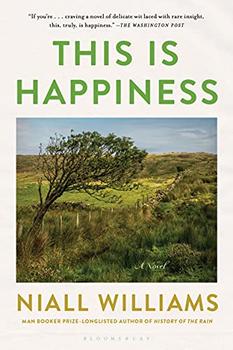Summary | Excerpt | Reviews | Beyond the Book | Readalikes | Genres & Themes | Author Bio

Excerpt
This is Happiness
It had stopped raining.
Nobody in Faha could remember when it started. Rain there on the western seaboard was a condition of living. It came straight-down and sideways, frontwards, backwards and any other wards God could think of. It came in sweeps, in waves, sometimes in veils. It came dressed as drizzle, as mizzle, as mist, as showers, frequent and widespread, as a wet fog, as a damp day, a drop, a dreeping, and an out-and-out downpour. It came the fine day, the bright day, and the day promised dry. It came at any time of the day and night, and in all seasons, regardless of calendar and forecast, until in Faha your clothes were rain and your skin was rain and your house was rain with a fireplace. It came off the grey vastness of an Atlantic that threw itself against the land like a lover once spurned and resolved not to be so again. It came accompanied by seagulls and smells of salt and seaweed. It came with cold air and curtained light. It came like a judgement, or, in benign version, like a blessing God had forgotten he had left on. It came for a handkerchief of blue sky, came on westerlies, sometimes – why not? – on easterlies, came in clouds that broke their backs on the mountains in Kerry and fell into Clare, making mud the ground and blind the air. It came disguised as hail, as sleet, but never as snow. It came softly sometimes, tenderly sometimes, its spears turned to kisses, in rain that pretended it was not rain, that had come down to be closer to the fields whose green it loved and fostered, until it drowned them.
All of which, to attest to the one truth: in Faha, it rained.
But now, it had stopped.
Not that anyone in Faha noticed. First, because it happened just after three o'clock on Spy Wednesday and the parish was concertina'd inside the Men's Aisle, the Women's Aisle and the Long Aisle of the sinking church which at that time was still called St Cecelia's. Second, when the parishioners came outside their minds had been exalted by the Latin, and the suffering of Christ the Redeemer made inconsequential thoughts of anything else. And third, they and the rain had been married so long they no longer took notice of each other.
I myself am seventy-eight years and telling here of a time over six decades ago. I know it seems unlikely that Faha then might have been the place to learn how to live, but in my experience the likely is not in God's lexicon.
Now, that world, the one whose front doors were never closed in the daytime, whose back doors were never locked but unlatched and entered on an evening, where you stepped down, God bless, on to a flag floor into a cloud of turf and tobacco smoke, that one has perished. And though some of its people, like Michael Donnelly, Delia Considine, Mary Egan and Marty Brogan, have postponed the graveyard and are in lonely old houses out the country that are home to rheumatism and damp and the battle of the long afternoons, its doors are shielded by caution and fear of the corrosive nature of nostalgia. And because I'm antique myself now, aware that by the mercy of creation the soonest thing to evaporate in memory is hardship and rain, I understand that between then and now, as between mystery and meaning, there's maybe too great a gap, and in the world you're living, this one, the one where it stopped raining in Faha on the Wednesday of Holy Week, might be too far, too remote in time and manner for you to enter.
Bear with me awhile; grandfathers have few privileges and the knowledge of your own redundancy has a keen tooth.
A hundred books could not capture a single village. That's not a denigration, that's a testament. Faha was no more nor less than any other like place. If you could find it, you'd be on your way somewhere else. The country is filled with places of more blatant beauty. Good luck to them. Faha doesn't care. It long since accepted that by dint of personality and geography its destiny was to be a place passed over, and gently, wholly forgotten.
Excerpted from This Is Happiness by Paige Williams. Copyright © 2019 by Paige Williams. Excerpted by permission of Bloomsbury USA. All rights reserved. No part of this excerpt may be reproduced or reprinted without permission in writing from the publisher.
Our wisdom comes from our experience, and our experience comes from our foolishness
Click Here to find out who said this, as well as discovering other famous literary quotes!
Your guide toexceptional books
BookBrowse seeks out and recommends the best in contemporary fiction and nonfiction—books that not only engage and entertain but also deepen our understanding of ourselves and the world around us.